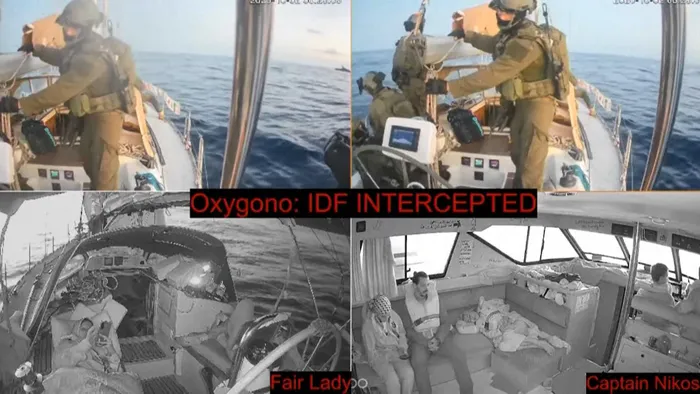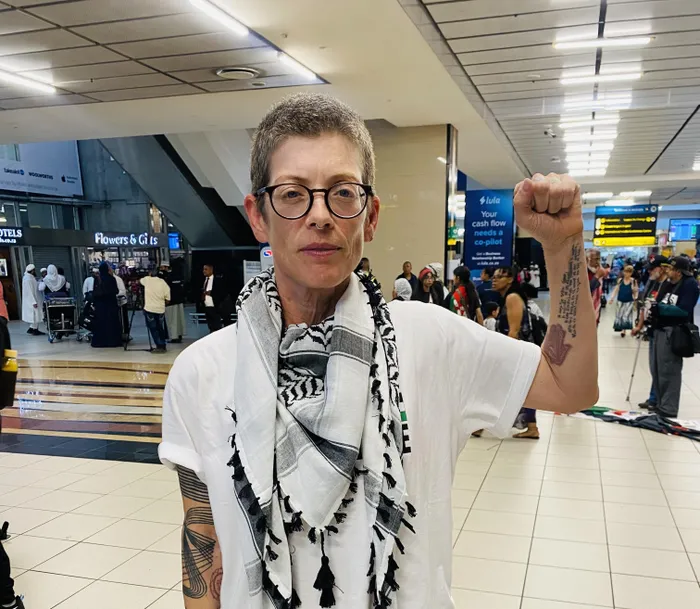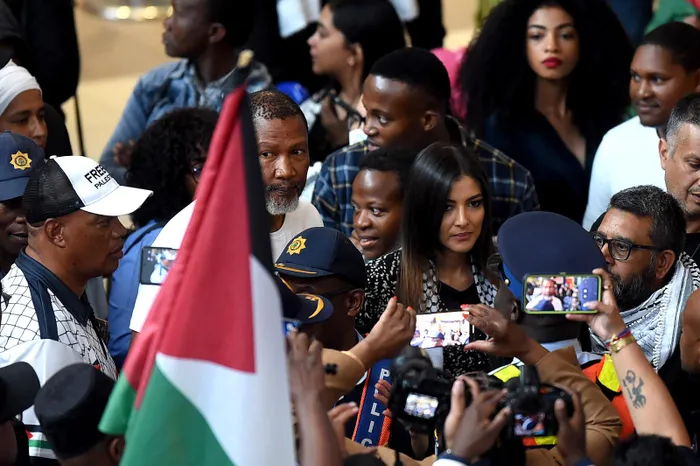Inside Israeli detention: Activist Ciarrie Shelver's harrowing experience after Gaza Flotilla interception

This video grab taken from a livestream broadcasted on October 2, 2025 by the Global Sumud Flotilla shows Israeli navy soldiers (up) boarding the vessel 'Oxygono', one of the Sumud flotilla boats, aiming at breaking the Israeli blockade of the Gaza Strip. Israel said on October 2, 2025 it will deport pro-Palestinian activists on an aid flotilla intercepted at sea as they headed towards Gaza, adding that none of the vessels had successfully breached its maritime blockade. According to Greek Foreign Minister George Gerapetritis, 39 of the around 45 ships have been intercepted and were headed to the Israeli port city of Ashdod, according to state broadcaster ERT.
Image: Handout / Global Sumud Flotilla / AFP
One of the Global Sumud Flotilla activists who was detained by Israeli forces en route to Gaza has described being denied medication, food, and access to a doctor, along with experiencing humiliation, physical violence, and sleep deprivation while in custody.
The group of six activists was detained by Israeli authorities last week while attempting to deliver humanitarian aid to Gaza.
They returned to South Africa on Wednesday, landing at OR Tambo International Airport to a warm welcome.
Supporters of the South African participants gathered in large numbers at the airport, waving Palestinian flags and holding signs that read, “Welcome Home.”

Ciarrie Shelver, a South African human rights activist based in Geneva, speaks to supporters after arriving at OR Tambo International Airport. Shelver described being denied food, medication, and sleep while detained by Israeli forces.
Image: Simon Majadibodu/IOL
Ciarrie Shelver, originally from Johannesburg, but based in Geneva where she works in human rights advocacy, was among those detained.
She shared details of the interception and their treatment while in Israeli custody.
“When the call was made for people to sign up for the flotilla, I did. What compelled me, of course, is the crisis in Gaza and, more broadly, in occupied Palestine,” she said.
Shelver said she was selected by the Swiss delegation and joined the flotilla in Sicily after completing training.
The group had travelled from Barcelona to Tunis before meeting her team in Sicily to continue the journey towards Gaza.
“We sailed as close as we could to Gaza before being intercepted by Israeli occupation forces,” she said.
The interception took place at night, beginning just after sunset and continuing until daybreak.
“We were intercepted 42 nautical miles from Gaza,” Shelver said.
“The Israelis deployed three types of military vessels: a large prison ship and two gunships. They circled our small sailing boats, separated us, boarded the vessels, and eventually took us to Ashdod.”
According to Shelver, they were handcuffed, their boats were seized, and the aid they were carrying was confiscated.
“We were abducted. Our boats were stolen. The aid was stolen,” she said.
Following their capture, they were transferred to an immigration detention facility and then a prison near Gaza.
Asked about their treatment in custody, Shelver said: “There were many violations of our human rights under various UN conventions - denial of medication, denial of access to a doctor, denial of food for a period of time, humiliation, physical violence, and sleep deprivation. A number of tactics were deployed on us.”

Crowds wave Palestinian flags and sing in solidarity as they welcome the return of South African members of the Global Sumud Flotilla at OR Tambo International Airport.
Image: Itumeleng English/Independent Newspapers
“Still, this was nothing compared to what Palestinians face daily.”
Shelver described finding messages on the walls of their cells, left by Palestinian detainees.
“The cells we were in are usually where male Palestinian and Gazan detainees are kept. They had written their stories - letters to mothers, to families, stories of not knowing where they were being taken, bloodstains on the walls.”
“These reminded us that this is not about us. We were doing the very least we could to save our own humanity in the face of this genocide,” she added.
“The focus must remain on ending the blockade, ending the siege, ending the genocide, and liberating all of Palestine.”
Jared Sacks, one of the South African delegates who had planned to travel as part of the flotilla but was unable to board due to technical sabotage of some vessels, expressed his support for the returning activists.
“Unfortunately, our boats weren’t working and some were sabotaged, so not all of us made it. But I think I can speak for everyone here - we will do our best to be on the next flotilla,” he said.
Sacks said the returning activists had become like family to those waiting in Tunis.
“We spent two weeks together, every day. It was hard to watch them go and even harder to watch them being abducted by Israeli forces. We monitored the situation constantly - watching trackers, reading every report,” he said.
“But the story is not about us or even them. The story is about the people of Gaza. They went to deliver humanitarian aid to people being deliberately starved by the Israeli regime.”
Cape Times